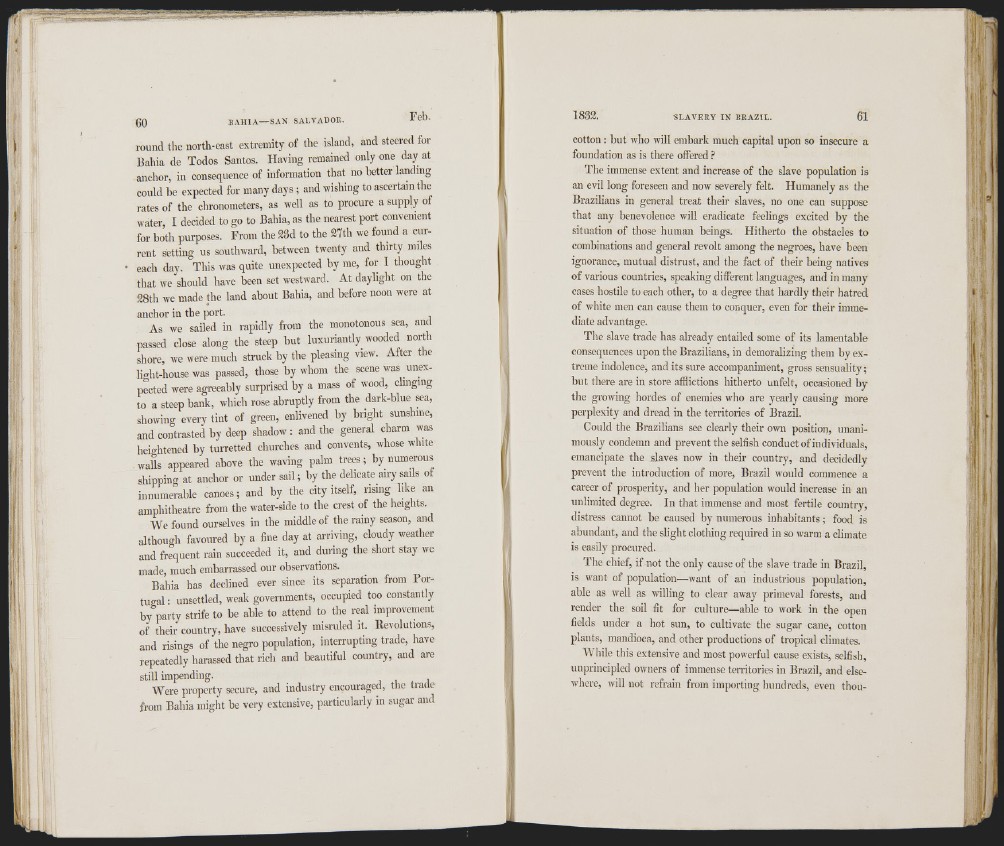
!{ I il
! ;i
Jt
60 BAHIA— SAN SALVADOR. Feb.
round the north-east extremity of the island, and steered for
Bahia de Todos Santos. Having remained only one day at
anchor, in consequence of information that no better landing
could he expected for many days ; and wishing to ascertain the
rates of the chronometers, as well as to procure a supply of
water, I decided to go to Bahia, as the nearest port convenient
for both purposes. From the 23d to the 27th we found a current
setting us southward, between twenty and thirty miles
each day. This was quite unexpected by me, for I thought
that we should have been set westward. At daylight on the
28th we made the land about Bahia, and before noon were at
anchor in the port.
As we sailed in rapidly from the monotonous sea, and
passed close along the steep hut luxuriantly wooded north
shore, we were much struck by the pleasing view. After the
light-house was passed, those by whom the scene was unexpected
were agreeably surprised by a mass of wood, clinging
to a steep hank, which rose abruptly from the dark-blue rea,
showing every tint of green, enlivened by bright sunshine,
and contrasted by deep shadow: and the general charm was
heightened by turretted churches and convents, whose white
. walls appeared above the waving palm trees; by numerous
shipping at anchor or under sail; by the delicate airy sails of
innumerable canoes; and by the city itself, rising like an
amphitheatre from the water-side to the crest of the heights.
We found ourselves in the middle of the rainy season, and
although favoured by a fine day at arriving, cloudy weather
and frequent rain succeeded it, and during the short stay we
made, much embarrassed our observations.
Bahia has declined ever since its sepai-ation from Portugal
■ unsettled, weak governments, occupied too constantly
by party strife to he able to attend to the real improvement
of their country, have successively misruled it. llevolutions,
and risings of the negro population, interrupting trade, have
repeatedly harassed that rich and beautiful country, and arc
still impending.
Were property secure, and industry encouraged, the trade
from Bahia might be very extensive, particularly in sugar and
1832. SLAVERY IN BRAZIL. 61
cotton : but who will embark much capital upon so insecure a
foundation as is there offered.?
The immense extent and increase of the slave population is
an evil long foreseen and now severely felt. Humanely as the
Brazilians in general treat their slaves, no one can suppose
that any benevolence will eradicate feelings excited by the
situation of those human beings. Hitherto the obstacles to
combinations and general revolt among the negroes, have been
ignorance, mutual distrust, and the fact of their being natives
of various countries, speaking different languages, and in many
cases hostile to each other, to a degree that hardly their hatred
of white men can cause them to conquer, even for their immediate
advantage.
The slave trade has already entailed some of its lamentable
consequences upon the Brazilians, in demoralizing them by extreme
indolence, and its sure accompaniment, gross sensuality;
but there are in store afflictions hitherto unfelt, occasioned by
tlie growing hordes of enemies who are yearly causing more
perplexity and dread in the territories of Brazil.
Could the Brazilians see clearly their own position, unanimously
condemn and prevent the selfish conduct of individuals,
emancipate the slaves now in their country, and decidedly
prevent the introduction of more, Brazil would commence a
career of prosperity, and her population would increase in an
unlimited degree. In that immense and most fertile country,
distress cannot be caused by numerous inhabitants ; food is
abundant, and the slight clothing required in so warm a climate
is easily procured.
The chief, if not the only cause of the slave trade in Brazil,
is want of population—want of an industrious population,
able as well as willing to clear away primeval forests, and
render the soil fit for culture—able to work in the open
fields under a hot sun, to cultivate the sugar cane, cotton
plants, mandioca, and other productions of tropical climates.
While this extensive and most powerful cause exists, selfish,
unprincipled owners of immense territories in Brazil, and elsewhere,
will not refrain from importing hundreds, even thouÈy
.Ì"